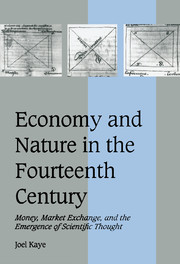 Economy and Nature in the Fourteenth Century
Economy and Nature in the Fourteenth Century Published online by Cambridge University Press: 16 July 2009
When historians and economists speak of the monetization of European society in the twelfth and thirteenth centuries, they are speaking in relative rather than absolute terms of a multi-faceted social process. Increases in the volume of coinage in circulation and the frequency of monetary transactions are only two of many factors involved. The process of monetization was inextricably tied to what has been called “the commercial revolution of the thirteenth century”: the rapid growth of trade, markets, and towns; the acceleration of agricultural and craft production; the evolution of specialized commercial enterprises and techniques; and the penetration of monetary and commercial values into all areas of social life. In this sense, the process of monetization is first apparent in the Italian cities of the late eleventh and twelfth centuries. For England and France, historians identify the “long” thirteenth century – that is, between approximately 1180 and 1320 – as the period of most rapid monetization.
The accelerated use of money had ever-expanding social, economic, and intellectual consequences. As the process of monetization gathered speed, habits of thought and perception initially restricted to those actively engaged in commerce came to be adopted by members of all segments of society. Among the most characteristic of these new habits were: the focus on monetary profit and loss in a wide range of decision making; the recognition of the importance of detailed written records for this calculation; the resulting broad development of literacy and numeracy; and the translation of qualitative values into quantitative, often monetary, terms as a way to simplify the process of calculation.
To save this book to your Kindle, first ensure no-reply@cambridge.org is added to your Approved Personal Document E-mail List under your Personal Document Settings on the Manage Your Content and Devices page of your Amazon account. Then enter the ‘name’ part of your Kindle email address below. Find out more about saving to your Kindle.
Note you can select to save to either the @free.kindle.com or @kindle.com variations. ‘@free.kindle.com’ emails are free but can only be saved to your device when it is connected to wi-fi. ‘@kindle.com’ emails can be delivered even when you are not connected to wi-fi, but note that service fees apply.
Find out more about the Kindle Personal Document Service.
To save content items to your account, please confirm that you agree to abide by our usage policies. If this is the first time you use this feature, you will be asked to authorise Cambridge Core to connect with your account. Find out more about saving content to Dropbox.
To save content items to your account, please confirm that you agree to abide by our usage policies. If this is the first time you use this feature, you will be asked to authorise Cambridge Core to connect with your account. Find out more about saving content to Google Drive.